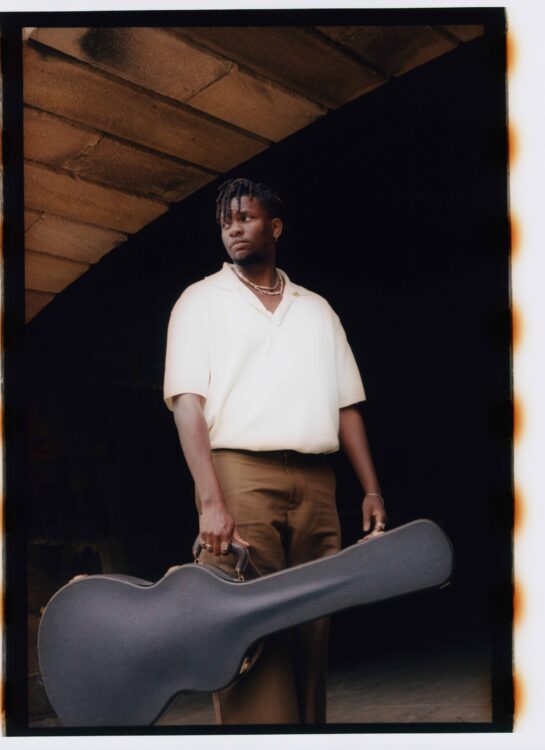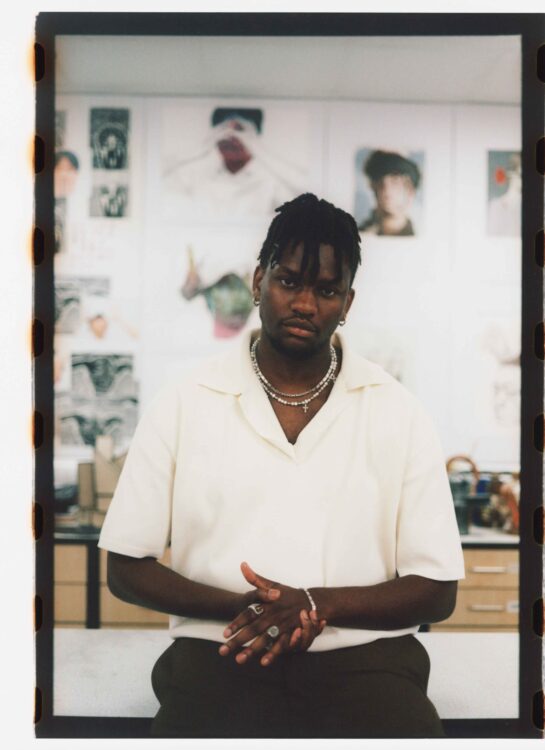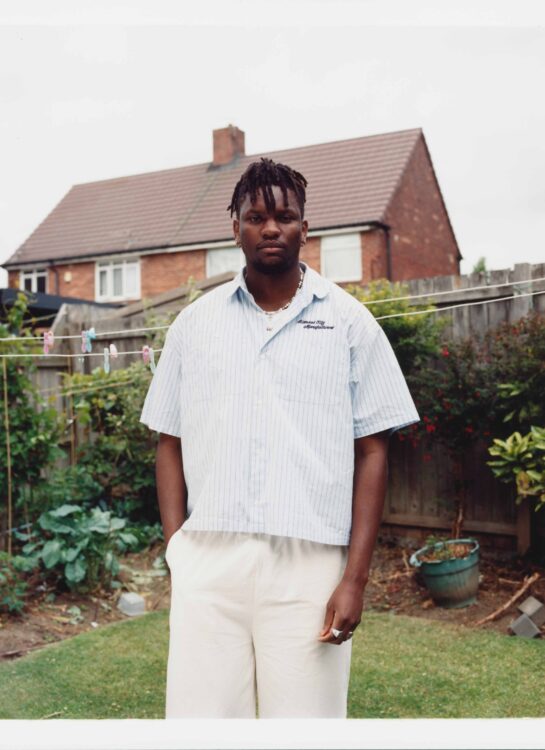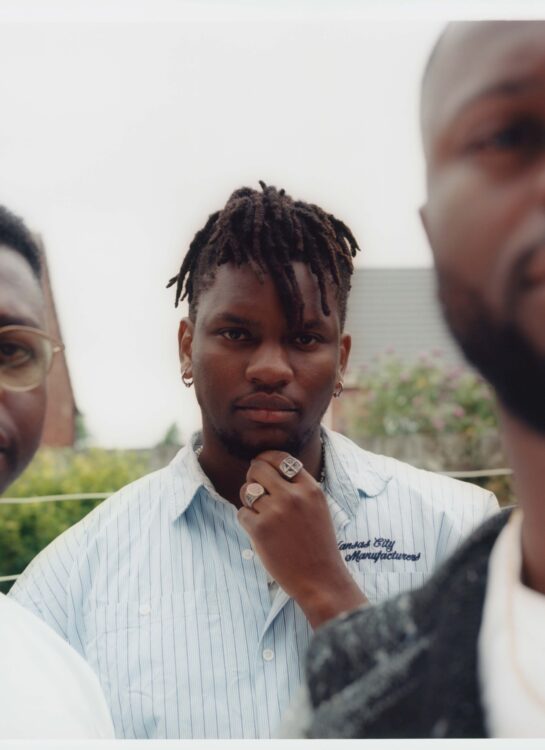- Words James Hughes
- Agency Studio Notion
- Photographer & Director Jamie Sinclair
- Creative Director Daisy Deane
- DOP Ali Hutchinson
- Second Camera Op Steven-Lee Sinclair
- Sound Operator Richard Scott
- Focus Puller Tom Littlewood
- Production assistant Laura Moscrop
- Editor Jess Vincent
- Grading Sharon Chung
After an explosive year for the genre-defiant Geordie, Victor Ray looks to the next chapter of his career as a Spotify RADAR artist.
Victor Ray has certainly been on a journey in his musical career. With humble beginnings as a busker on the streets of Newcastle, the singer’s discography almost acts as a linear narrative of defiant growth. Now, having been selected as a Spotify RADAR artist, the singer-songwriter is building on his momentum with the release of a new single, ‘Contagious’.
‘Contagious’ is a reflective track with Victor urgently considering the addictive essence of the dangerous loves in our lives. Whether he’s contemplating a romance that’s running out of time or the allure of his musical craft, Victor’s honest approach to songwriting imbues the song with real tension.
The track sees him channel the determination of his busking days into an emotional vocal display, which balances harmonically with a groovy dance beat to keep you moving nonetheless. This song boldly opens this next chapter of Victor’s career, following a stellar year which has seen the young star sell out venues across the US and Australia, attend Paris fashion week and perform to 3.6 million people at the VE Day 80th anniversary celebrations.
As he launches the next stage of his career as a Spotify RADAR artist, Victor has taken stock of his career thus far in a new documentary, which gives fans an intimate look at his path to success. It hasn’t been an easy ride for Victor, but growing up in the lively centre of the North East has given him the grit to persevere and prove his worth not only to others but also to himself.
We chatted with Victor Ray to delve deeper into how it feels to be a Spotify RADAR artist, gaining the confidence to experiment with his sound and what it’s like to return to Newcastle to tell his story.


Being chosen as Spotify’s UK RADAR artist is both a recognition and a responsibility. You follow on from artists like Central Cee, Rachel Chinouriri, and Wet Leg, to name a few. What does that platform offer you that feels different from traditional label or press support?
For me, that platform is as much vindication as it is motivation. I used to watch people’s Spotify RADAR moments, and people like Central Cee and Rachel are the calibre of artists that I look up to. I want to make art worthy of my peers’ recognition, and these are the kinds of people that I see in that light. It’s a huge responsibility for me, and it’s one that I’m honoured to have.
Creating a documentary with Spotify RADAR in Newcastle feels like a powerful way of grounding your story. Why did that format, and this partnership, feel like the right way to tell it now?
Newcastle is my hometown, but it’s more than just where I first busked or did my first gig; the soul of that city is in me. The way that the people are – the energy, the kindness of Northerners, plus the roughness of some Geordies – it takes a certain level of grit to do what I’m doing from the ground up like I did. I think it was so important to go back and see the city to feel it. It makes the story and adds pieces to the puzzle that finally make sense once you have the context. I’m so glad we went to Newcastle to tell that part of it.
‘Hearts Break and People Change’ on your I WILL. EP feels both raw and resigned. Can you walk us through how that song came together and whether it was cathartic or difficult to record?
I wrote it so long ago, in 2022 or 2021, when I was really going through that “arc” in my life. I went into the studio with my friend Jake, who produced that track, and I was just laying it all out for him. I was like, “Nah, my friend is moving mad and I don’t know what’s going on. I’m really hurt and confused, but maybe this is normal? Is this just what happens in life?”
I’m 26 now, so that was five years ago, and I was grappling with the fact that this pain for me might just be one of those bittersweet moments of life that’s normal but difficult. I went through that process in the studio, and the song just came out. I didn’t even realise the song was finished until the next day, when I listened back and was like, “Oh, I really therapised that whole thing, and now I’ve got my answer to my question.” It wasn’t difficult to record, but it was definitely a journey.


Across your EPs, from I Was, I Felt, I Tried, and now I WILL., there’s a clear arc, almost like chapters in a diary. Did you always intend for them to feel like a sequence, or did that emerge naturally as you wrote?
A bit of both. I had an overall plan of trying to tell the story, with all of the EPs serving as the prologue to my career. I have so many musical influences that I tap into, so I wanted to get those across. I also started busking and writing songs on my guitar, and thinking, “Well, I want to put out the first musings that I have, or as close to it as I have.” Calling the first project I WAS. was me thinking in a meta-way, like, “This is the start,” and I’m going to look back on this and be glad that this was something I put out when I started. Going into it, I felt like I really tried.
The sequence wrote itself in a way. It was just as much about my growth as a person as it was about my confidence. Being able to blend and jump into different sounds, and being more confident doing it, built a sequence which helped me find peace with my sound. It was an arc for my story, for my fans to look at, but also for myself to grow. I wanted to build a pathway to allow myself to grow into who I am as an artist.
When you walk past spots in Newcastle where you used to busk, what memories come back to you most, and how do those moments still shape the way you perform today?
When I walk past those spots in Newcastle, I see it all. It wasn’t scary when I first started. It wasn’t that I was scared, but the start felt like a very big deal. I was like, “Oh my gosh, I’ve got to make this work.” When I walk past there now, I feel that excitement in me.
What’s really beautiful is that I see buskers there now – young kids, my age when I started or even younger – and I can see their passion and their hopeful eyes. I have only good feelings and memories, because no matter how much of a slug it felt when I was there, it was actually really fun and exciting. I felt like the city had my back in so many ways.
If you consider the through-line between I WAS. and I WILL., what has shifted most in you as a person, not just as an artist?
From ‘Hollow’ to ‘World At My Feet’, so much has changed. Even just the titles of those two songs indicate how much I’ve grown. ‘Hollow’ is a song that really felt like sitting and boiling in this pain and the hurt that I was in when I wrote that song. Then, with ‘World At My Feet’, even earning the right to say that the world is at my feet was a big thing. Even if I have the ambition to become the biggest artist in the world, I still have so much learning and figuring out to do. It’s all good wanting to get there, but how you’re going to get there is what you really need to figure out.
Throughout that whole journey, my confidence and integrity shine through on those EPs. I really stuck to my guns in what kind of music I wanted to release. You can see that I was patient and got to a place where I could say: “The world is at my feet. I know who I am.”
Since launching in 2020, Spotify’s RADAR program has supported over 1,000 emerging artists worldwide, driving more than 338 billion streams and billions of song discoveries. RADAR reflects Spotify’s mission to identify, nurture, and amplify the next generation of global music talent.


